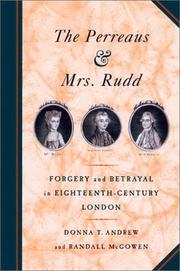| Listing 1 - 2 of 2 |
Sort by
|

ISBN: 0520923707 1597348058 9780520923706 9781597348058 0520220625 9780520220621 Year: 2001 Publisher: Berkeley University of California Press
Abstract | Keywords | Export | Availability | Bookmark
 Loading...
Loading...Choose an application
- Reference Manager
- EndNote
- RefWorks (Direct export to RefWorks)
The Perreaus and Mrs. Rudd tells the remarkable story of a complex forgery uncovered in London in 1775. Like the trials of Martin Guerre and O.J. Simpson, the Perreau-Rudd case-filled with scandal, deceit, and mystery-preoccupied a public hungry for sensationalism. Peopled with such familiar figures as John Wilkes, King George III, Lord Mansfield, and James Boswell, this story reveals the deep anxieties of this period of English capitalism. The case acts as a prism that reveals the hopes, fears, and prejudices of that society. Above all, this episode presents a parable of the 1770's, when London was the center of European finance and national politics, of fashionable life and tell-all journalism, of empire achieved and empire lost. The crime, a hanging offense, came to light with the arrest of identical twin brothers, Robert and Daniel Perreau, after the former was detained trying to negotiate a forged bond. At their arraignment they both accused Daniel's mistress, Margaret Caroline Rudd, of being responsible for the crime. The brothers' trials coincided with the first reports of bloodshed in the American colonies at Lexington and Concord and successfully competed for space in the newspapers. From March until the following January, people could talk of little other than the fate of the Perreau's and the impending trial of Mrs. Rudd. The participants told wildly different tales and offered strikingly different portraits of themselves. The press was filled with letters from concerned or angry correspondents. The public, deeply divided over who was guilty, was troubled by evidence that suggested not only that fair might be foul, but that it might not be possible to decide which was which. While the decade of the 1770's has most frequently been studied in relation to imperial concerns and their impact upon the political institutions of the day, this book draws a different portrait of the period, making a cause célèbre its point of entry. Exhaustively researched and brilliantly presented, it offers both a vivid panorama of London and a gauge for tracking the shifting social currents of the period.
Trials (Forgery) --- Forgers --- Forgery --- Perreau, Daniel, --- Perreau, Robert, --- Rudd, Margaret Caroline, --- Gore, --- Gratten, --- Perreau, Margaret Caroline, --- Perreau, --- Rudd, M. C. --- Rudd, Marg. Car. --- Rudd, --- Youngson, Margaret, --- 1770s. --- 18th century. --- american revolution. --- bonds. --- british colonies. --- british history. --- capitalism. --- character. --- crime. --- daniel perreau. --- debt. --- economics. --- empire. --- english history. --- finance. --- forgery. --- fraud. --- georgian england. --- hanging. --- james boswell. --- john wilkes. --- journalism. --- king george iii. --- legal trial. --- london. --- lord mansfield. --- margaret rudd. --- mistress. --- national politics. --- nonfiction. --- perreau brothers. --- public character. --- robert perreau. --- scandal. --- sensation journalism. --- stocks. --- trial. --- twins.

ISBN: 1282758721 9786612758720 0520921399 1597349542 9780520921399 058546605X 9780585466057 9781597349543 0520214935 9780520214934 Year: 2002 Volume: 47 Publisher: Berkeley University of California Press
Abstract | Keywords | Export | Availability | Bookmark
 Loading...
Loading...Choose an application
- Reference Manager
- EndNote
- RefWorks (Direct export to RefWorks)
In 1666, King Charles II felt it necessary to reform Englishmen's dress by introducing a fashion that developed into the three-piece suit. We learn what inspired this royal revolution in masculine attire--and the reasons for its remarkable longevity--in David Kuchta's engaging and handsomely illustrated account. Between 1550 and 1850, Kuchta says, English upper- and middle-class men understood their authority to be based in part upon the display of masculine character: how they presented themselves in public and demonstrated their masculinity helped define their political legitimacy, moral authority, and economic utility. Much has been written about the ways political culture, religion, and economic theory helped shape ideals and practices of masculinity. Kuchta allows us to see the process working in reverse, in that masculine manners and habits of consumption in a patriarchal society contributed actively to people's understanding of what held England together.Kuchta shows not only how the ideology of modern English masculinity was a self-consciously political and public creation but also how such explicitly political decisions and values became internalized, personalized, and naturalized into everyday manners and habits.
Men's clothing --- Masculinity --- History. --- Men --- Men's apparel --- Men's wear --- Menswear --- Clothing --- Mens clothing --- CDL --- 391 --- Clothing and dress --- Men's products --- History of civilization --- History of the United Kingdom and Ireland --- anno 1500-1799 --- anno 1800-1899 --- History --- Mens clothing - England - History. --- Masculinity - History. --- Masculinity - History --- capitalism. --- character. --- chivalry. --- clothing. --- consumption. --- costume history. --- early modern england. --- english masculinity. --- fashion and clothing. --- fashion. --- gender studies. --- gender. --- history. --- king charles ii. --- manliness. --- masculine attire. --- masculine character. --- masculine manners. --- masculine. --- masculinity. --- mens fashion. --- menswear. --- modern england. --- monarchy. --- moral authority. --- nonfiction. --- patriarchy. --- public character. --- public man. --- reputation. --- self fashioning. --- self made man. --- success. --- suit. --- three piece suit.
| Listing 1 - 2 of 2 |
Sort by
|

 Search
Search Feedback
Feedback About UniCat
About UniCat  Help
Help News
News